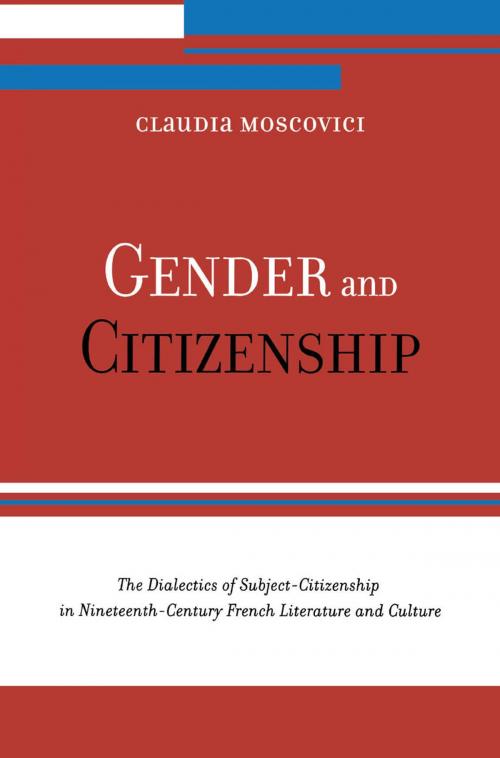Gender and Citizenship
The Dialectics of Subject-Citizenship in Nineteenth Century French Literature and Culture
Fiction & Literature, Literary Theory & Criticism, French, European| Author: | Claudia Moscovici | ISBN: | 9780742581296 |
| Publisher: | Rowman & Littlefield Publishers | Publication: | May 10, 2000 |
| Imprint: | Rowman & Littlefield Publishers | Language: | English |
| Author: | Claudia Moscovici |
| ISBN: | 9780742581296 |
| Publisher: | Rowman & Littlefield Publishers |
| Publication: | May 10, 2000 |
| Imprint: | Rowman & Littlefield Publishers |
| Language: | English |
Moscovici proposes a new understanding of how gender relations were reformulated by both male and female writers in nineteenth-century France. She analyzes the different versions of gendered citizenship elaborated by Friedrich Hegel, George Sand, Honore de Balzac, Auguste Comte and Herculine Barbin revealing a shift from a single dialectical (or male-centered) definition of citizenship to a double dialectical (or bi-gendered) one in which each sex plays an important role in subject-citizenship and is defined as the negation of the other sex. Moscovici further argues that a double dialectical pattern of androgyny endows women with a (relational) cultural identity that secures their paradoxical roles as both representatives and outsiders to subject-citizenship in nineteenth-century French society and culture.
Moscovici proposes a new understanding of how gender relations were reformulated by both male and female writers in nineteenth-century France. She analyzes the different versions of gendered citizenship elaborated by Friedrich Hegel, George Sand, Honore de Balzac, Auguste Comte and Herculine Barbin revealing a shift from a single dialectical (or male-centered) definition of citizenship to a double dialectical (or bi-gendered) one in which each sex plays an important role in subject-citizenship and is defined as the negation of the other sex. Moscovici further argues that a double dialectical pattern of androgyny endows women with a (relational) cultural identity that secures their paradoxical roles as both representatives and outsiders to subject-citizenship in nineteenth-century French society and culture.















